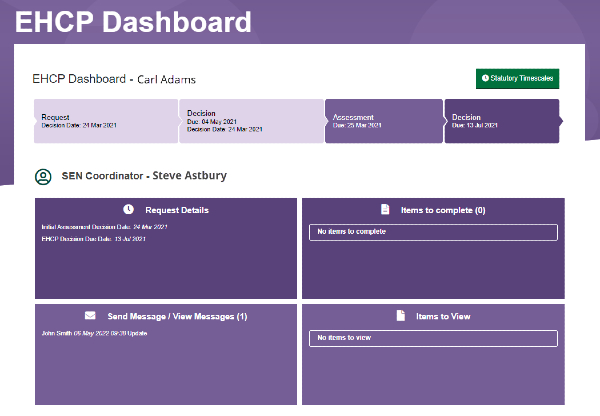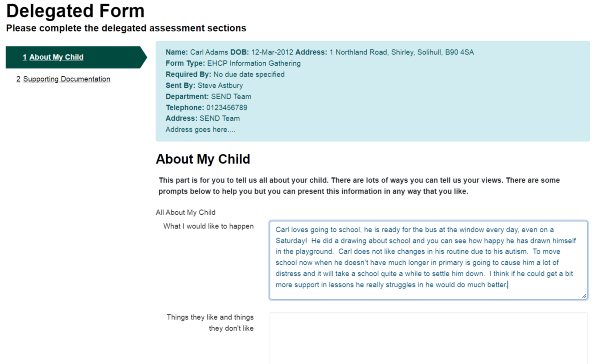
By Ida Cohen, senior consultant social worker, Liquidlogic
‘Listening to the voice of the child’, ‘involving service users’ and ‘co-production’ are phrases used typically to describe how children’s services should engage with children and families to ensure they are listened to, and that their contributions are routinely considered as part of a partnership approach for assessments and intervention.
In a June 2021 report on special educational needs and disability (SEND), based on a series of inspections, Ofsted said: “There were some more positive findings in some of the areas we revisited, where parents and carers had been given meaningful involvement in planning and decision-making. The role of the parent-carer forum featured prominently in the most successful areas. In these, leaders had understood that co-production meant working with families as equal partners.”
We believe that portal technology can help forge effective collaboration with children and families by helping them to feel part the the assessment, planning and reviewing stages.
A tried-and-tested solution
From online banking and grocery orders to booking holidays, usage of portal type technology is widespread and it has become a tried-and-tested tool to deliver effective services. The same technology has started to transform the Liquidlogic electronic case management system so that it can now be used to engage with children, families and carers.
A portal account is not just a way of accessing information that is being shared with families by their worker. It is also where they can collaborate on forms, respond to surveys or consultation documents, send messages to their workers and see a full library of documents that before would have been emailed or posted, keeping all their data secure.
To illustrate, here is a fictional example of how this might be experienced by a parent of a child with SEND.
Case study: Elly and Carl
My name is Elly, I am Carl’s mum. Carl is 10 years old and has autism. Carl has lots of difficulties both at home and at school. He goes to our local primary school.
Carl’s head teacher referred him to the council for an education, health and care assessment as he thinks Carl needs more help than the school is currently able to provide. I agree, as he cannot participate in some activities at all as his behaviour becomes unmanageable.
The school said that he either needs to have more in-class support or he may need to move to a special school. When he can’t be at school, I have him at home and must juggle things between Carl and his sisters; I end up getting into trouble with their schools as I’m often late picking them up.
I was contacted by someone called Steve Astbury recently. He explained that he works in the SEND team and would work with me and other professionals who know Carl, to assess his educational needs.
He said it was important that I have a say in this – as I know what the day-to-day experience of caring for Carl is like – and express what I would want to see happen for Carl going forward.
Steve sent me an email with a link to participate in the assessment process and communicate with him through what he called a portal account. When I got the email, I clicked on the link, created a simple username and password and then got an email notification that my account had been activated.
Once logged in, I could see Steve’s details and those of Carl’s school and social worker. I could see the school’s referral for Carl as Steve had published it for me to read. I also saw that Steve had posted a message for me to let him know when I had logged in by responding to his welcome message, which I did.
It was clear that I am only at the first stage of the education, health and care plan (EHCP) process and there are other stages to follow, which Steve explained. I know where I am in the process and can check back for progress updates.
 Since then, we have continued to communicate via the portal. Steve has visited again and has been progressing Carl’s assessment. Yesterday, he posted the latest version to me and asked me to complete my section of the assessment. He said he would call me tomorrow so we could discuss it in case I had any queries. It was quite simple, really, just like an online survey.
Since then, we have continued to communicate via the portal. Steve has visited again and has been progressing Carl’s assessment. Yesterday, he posted the latest version to me and asked me to complete my section of the assessment. He said he would call me tomorrow so we could discuss it in case I had any queries. It was quite simple, really, just like an online survey.
Steve called today to discuss my contribution to Carl’s assessment. I said that Carl had made a drawing over the weekend about school which shows he really does love going there.
 Steve said I could send it over via the portal as it allows me to upload any documents I want to send with my response. I have now submitted everything and he said that when it’s finished, he will publish the final version, which goes to a panel, so that I can read it.
Steve said I could send it over via the portal as it allows me to upload any documents I want to send with my response. I have now submitted everything and he said that when it’s finished, he will publish the final version, which goes to a panel, so that I can read it.
Consolidated information across services
Information gathered via portal collaboration for a person receiving services is reused, where required, for other services that may be needed. This means the person does not have to provide their personal data repeatedly to the local authority when they need other forms of support, such as early years portage service, free school meals, post-16 college placements or sensory support.
The person has one central record on the case management system, which is accessed and kept up to date by all professionals in children and family services. This enables professionals working with families to provide the best possible service with the best possible outcomes, because everyone has a full picture of the family’s circumstances and needs.
Find out out more about Liquidlogic’s Portal solutions by visiting our website or emailing marketing@liquidlogic.co.uk.


 Family help: one local authority’s experience of the model
Family help: one local authority’s experience of the model  ‘I spent the first three months listening’: how supportive leadership can transform children’s services
‘I spent the first three months listening’: how supportive leadership can transform children’s services  How senior leaders in one authority maintain a culture of excellence
How senior leaders in one authority maintain a culture of excellence  How staff support ensures fantastic outcomes for children and families
How staff support ensures fantastic outcomes for children and families  Workforce Insights – showcasing a selection of the sector’s top recruiters
Workforce Insights – showcasing a selection of the sector’s top recruiters 

 Facebook
Facebook X
X LinkedIn
LinkedIn Instagram
Instagram
Comments are closed.